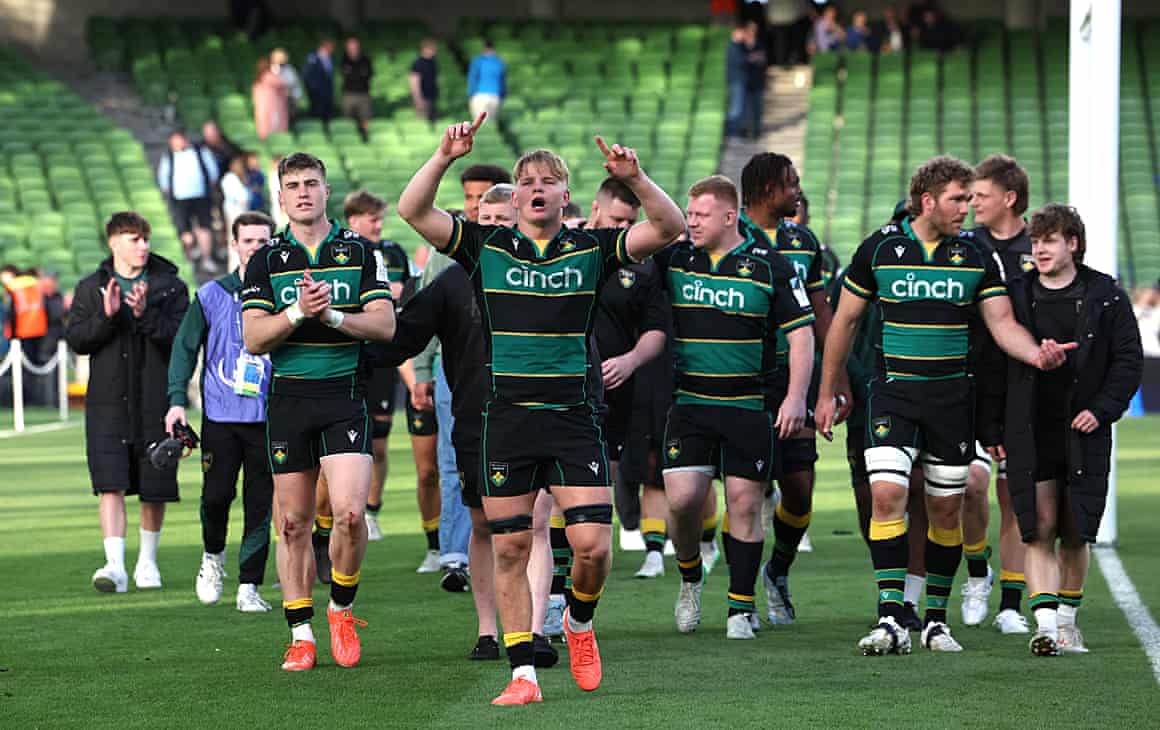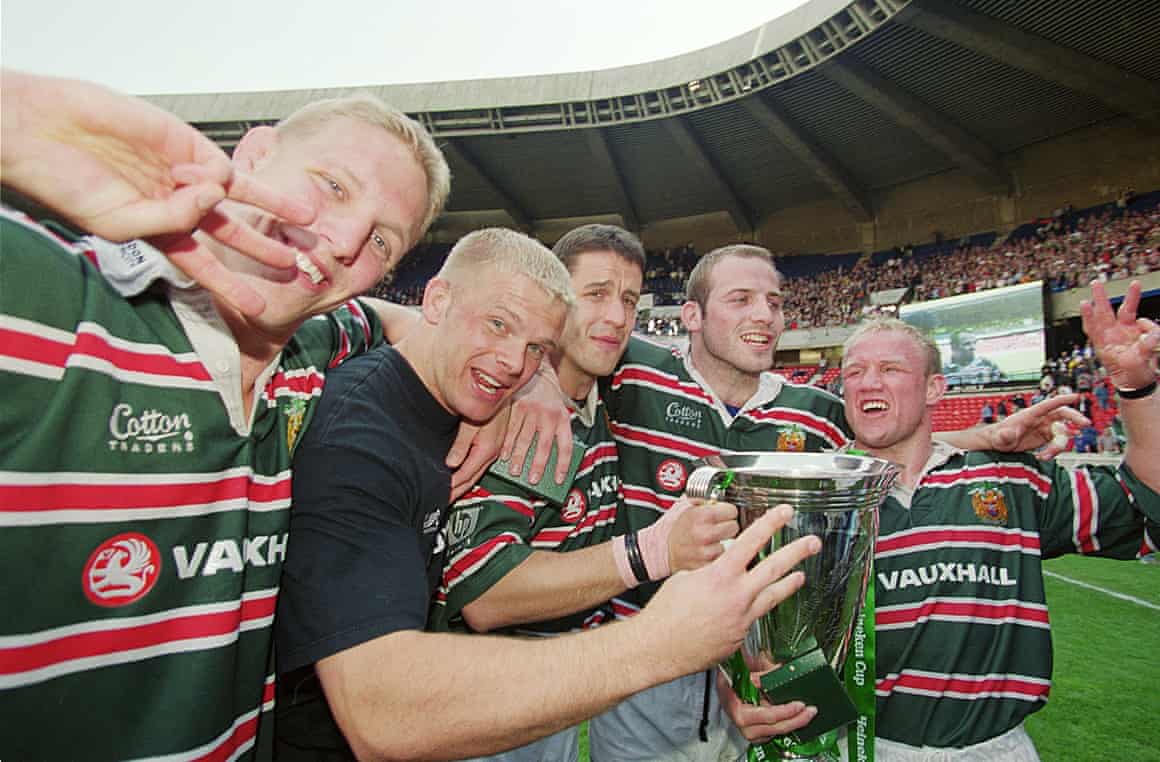 | | Rare English double in Europe would be a dream result for the Premiership | | | Northampton and Bath have a chance to restore English rugby to its pedestal, but French foes will have other ideas | |  |  Northampton players celebrate their victory against Leinster in the Champions Cup semi-finals. Photograph: Damien Eagers/PA
| |  | Robert Kitson |
| | | It has not happened very often. Just once in the past 20 years, to be precise. Winning a single trophy is hard enough but English clubs hoisting aloft both the Champions Cup and Challenge Cup in the same season would be a proper rarity. Other than the Covid-afflicted year of 2020 when Exeter Chiefs and Bristol Bears prevailed in mostly empty stadiums, the last time there was a Premiership double was in May 2004. Back then Wasps and Harlequins were the happy couple, beating Toulouse and Montferrand respectively. This week also features two Anglo-French finals with Northampton facing Bordeaux-Bègles in the main event and Bath tackling Lyon in Friday night’s amuse bouche. A measure of the challenge facing the English duo is that French clubs have hoovered up seven of the past eight available trophies, with South Africa collecting the other. That Gallic trend could continue if Bordeaux uncork their glorious attacking game and Lyon bely their modest 11th position in the Top 14 table. But given the depth of forward resources at Bath’s disposal and Northampton’s outstanding display in their semi-final win over Leinster, the two clubs can at least dream of a return to the distant days when English rugby was officially first among equals. To which some will rightly reply that the degree of correlation between Champions Cup pedigree and international success can fluctuate. True enough, but there are some persuasive past case studies. When, for example, was the English national team at its strongest in the professional era? Probably between 2001 and the 2003 World Cup. And which nation collected seven out of eight European trophies around that same period? You’ve guessed it. So while there remains a way to travel – and nothing can be remotely guaranteed in Cardiff – the tender green shoots of an English recovery are discernible. Steve Borthwick’s squad to tour Argentina this year, even without a battalion of Lions, will feature some exciting young talent by anyone’s standards. And when you buy a ticket to a club match at the moment, you are liable to receive better value for your money than you have in ages. It might be a stretch to suggest English rugby is quietly reinventing itself – Northampton’s Henry Pollock is not the shy retiring type – but a tad more confidence and a touch less introspection are discernible. On their day Saints, Bath, Bristol, Gloucester and Harlequins can all leave eye-catching vapour trails while Leicester, Sale and Saracens, in their slightly contrasting ways, are no slouches. What no one yet knows, however, is whether this is just a brief phase. Are Bath and Saints mere outliers? Will the financial muscle of the French clubs tip the balance? In that context the looming Cardiff finals feel important in terms of transforming perceptions as well as English self-belief. No one is suggesting Bordeaux and Lyon would not be worthy champions but an opportunity exists for the Premiership to send an overdue message to the rest of Europe and South Africa. There is certainly no shortage of motivation for Northampton as they seek to emulate the 2000 heroics of Pat Lam and co against Munster at Twickenham. These latter-day Saints are the defending English champions and, while their league form has been mixed, few if any teams have ever won away in Pretoria, Limerick and Dublin in the same season. Bath’s last Champions Cup title was even longer ago (though they did win the Challenge Cup at Worcester’s expense in 2008) but the hope is that good things will come to those who wait. Domestically Bath have been way ahead of the regular season pack, to the point where their supporters will be gutted should they fail to win the Premiership title. | | |  |  Joe Cokanasiga (right) celebrates scoring for Bath against Clermont Auvergne in the Champions Cup in January. Photograph: Simon King/ProSports/Shutterstock
| | | For all the ability of Scotland’s Finn Russell and their South African contingent – has there been a more consistently impactful bench player this season than the underrated Francois van Wyk? – the steady improvement of Ted Hill, Guy Pepper, Will Muir, Max Ojomoh and Ciaran Donoghue has also helped enormously That English quintet must all now be in the frame to tour Argentina and the US this summer (although Donoghue is qualified for Ireland as well). As with Saints, their development is a credit to those coaching and mentoring them. How interesting, in that regard, that the league’s most upwardly mobile teams all have something in common coaching-wise. Did you know that Phil Dowson, Johann van Graan, Lee Blackett, Sam Vesty, Alex Sanderson, George Skivington – not to mention Leicester’s new incoming coach, Geoff Parling – are all aged between 41 and 45? And all bar Van Graan are English … It hints at a coaching sweet spot in the modern game: influential voices from a younger generation with both an instinctive grasp of a fast-changing sport and a proactive relationship with today’s players. The current England head coach, Steve Borthwick, at 45, is from the same bracket and the extra freedom with which England have sought to play further reflects shifting attitudes. It makes for an increasingly virtuous circle: club and international players seeking to pursue similar objectives, a hugely promising clutch of emerging age-group internationals, more licence for decision-makers to play what they see. None of this is rocket science but, like a gum-shielded Rip Van Winkle, English rugby finally seems to be awakening from its tactical slumber. Eyes wide open, hearts full, expectations high. No wonder there is a buzz surrounding this weekend. Only two of England’s premier clubs, Saracens and Exeter, have claimed the Champions Cup since Wasps’ last triumph in 2007. Successfully update that statistic and a wider English renaissance may dawn sooner than people think. Lost weekends The fixtures are out for the 2026 men’s Six Nations and – shock horror – the championship will kick off on a Thursday night when France host Ireland. So much for a fun-filled Parisian weekend on the lash. Sorry, visiting galleries and museums. Now travelling Irish supporters face the prospect of having to take off at least two working days to attend. Not exactly the lost weekend of traditional legend. The reason for the Thursday switch is to avoid clashing with the opening ceremony of the Winter Olympics … to which the traditional answer would have been to schedule the game on a Saturday or Sunday instead. Tournament officials, however, are keener than ever to keep their television partners happy and so, for better or worse, Thursday it is. There will also be only one fallow weekend rather than two for the first time, posing logistical problems for, among others, diehard England fans whose side now face three away trips to Edinburgh, Rome and Paris and a home game against Ireland at Twickenham inside 29 days. Travelling fans have long been integral to the Six Nations’ popularity. The 2026 schedule threatens to test that special relationship. | | |  |  Not such bad news for French fans, at least. Photograph: Liam McBurney/PA
| | | One to watch … This weekend’s Cardiff finals coincide with another period of deep uncertainty within Welsh rugby. The Welsh Rugby Union is now saying there will no longer be four evenly funded professional clubs beyond 2027, neither confirming nor denying reports suggesting a region will be cut. With Cardiff and Dragons having already signed the new Professional Rugby Agreement, it further raises the stakes for Scarlets and Ospreys, neither of whom had signed up prior to the latest deadline. With a finite pot of money to go around, those seeking to resurrect Welsh rugby on and off the field have a far-reaching call to make. Memory lane This weekend’s Champions Cup final will stir memories of great renewals of the past. For Leicester fans it will be the unforgettable comeback in Paris after being 21-14 down, and under suffocating pressure following the sin-binning of their captain, Martin Johnson, when they managed to beat Stade Français 34-30 in 2001. “I don’t think at any stage we doubted one another and that total trust is the secret to our success. [Dean Richards] makes the players play for Leicester and each other, not for a pay packet,” said Austin Healey afterwards before Richards, as Robert Kitson reported, “could be seen in the front seat munching a takeaway from a paper bag” as the team bus sped across the Place de Saint-Cloud. “Continental sophisticates may shudder but the map of Europe is now plastered with tell-tale Tiger footprints,” our reporter memorably added. | | |  |  Leicester celebrate victory after beating Stade Français at the Parc des Princes. Photograph: Jamie McDonald/Getty Images
| | | Still want more? The needless controversy over foreign-born Lions players has ramped up the pressure on the squad, writes Gerard Meagher. In the Premiership over the weekend … Michael Aylwin took in Saints’ comeback victory against Saracens; Tom Dunn shone for Bath as they crushed Leicester; and the in-form George Ford guided Sale to an emphatic win over Bristol. And the incoming Wallabies coach, Les Kiss, will get an early taste of international rugby when he oversees the AUNZ Invitational XV against the Lions in Adelaide. Subscribe To subscribe to the Breakdown, just visit this page and follow the instructions. And sign up for The Recap, the best of our sports writing from the past seven days. | |
| | | Your support powers independent journalism | | |
|
| | |
| 
| Manage your emails | Unsubscribe | Trouble viewing? | | You are receiving this email because you are a subscriber to The Breakdown. Guardian News & Media Limited - a member of Guardian Media Group PLC. Registered Office: Kings Place, 90 York Way, London, N1 9GU. Registered in England No. 908396 |
|
|
|
|
|